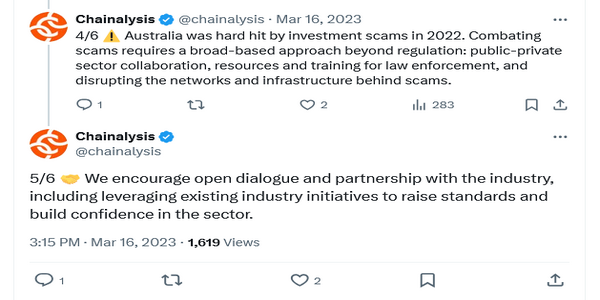Chainalysis’ Operation Spincaster uncovered that more than 2,000 crypto wallets owned by Australians fell victim to “approval phishing” scams. The Australian Federal Police is investigating a massive crypto wallet hack involving over 2,000 Australian-owned wallets
Following an investigation by Chainalysis, called Operation Spincaster, it was discovered that thousands of crypto wallets owned by Australians were targeted using “approval phishing” scams.
“The intelligence we’ve gathered during Operation Spincaster has revealed new tactics used by cybercriminals to defraud Australians,” said AFP Detective Superintendent Tim Stainton in a statement on August 4.
“It will form a key part of our ongoing investigations to identify cybercrime victims and disrupt offenders in Australia.”
Phishing scams: Massive crypto wallet hack
Operation Spincaster fights approval phishing scams by providing education, tools, and training.
In these scams, the scammer tricks the user into signing a malicious transaction, allowing them to transfer the victim’s tokens to their own wallet.
These scams are often found in fake investment schemes promising high returns or in romance scams, also known as pig-butchering scams.
Since May 2021, victims have lost about $4 billion to approval phishing scams.

Chainalysis is teaming up with the AFP’s Policing Cybercrime Coordination Center (PCCC) to help solve ongoing investigations.
This partnership began after PCCC staff held a workshop with Chainalysis to explore Operation Spincaster and find better ways to protect Australians.
“The workshop involved Chainalysis sharing intelligence about compromised wallets, training on tracing stolen funds, guidance on detecting ongoing scam attempts in real time, and discussions about how to contact and support victims of approval phishing.”
Cryptocurrency exchanges like BTC Markets, Binance, Crypto.com, Ebonex, Independent Reserve, OKX, SwyftX, and Wayex are also working to protect Australians from these scams, the AFP noted.
Over the past year, Australian banks have started taking measures to prevent cryptocurrency scams by restricting or blocking transfers to crypto exchanges.
This includes major banks like Commonwealth Bank, National Australia Bank, Westpac, Australia and New Zealand Banking Group, Bendigo Bank, and more recently, HSBC.
According to the country’s competition and consumer regulators, Australians lost up to $840 million in investment scams in 2023.

